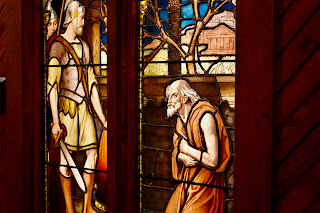Over the years many passages of the Bible have intrigued me, but few have struck me more profoundly than Romans 7, in which the apostle Paul candidly confesses his personal struggles.
The verses that stand out most are Romans 7:15-17, in which he seems to complain, “I do not understand what I do. For what I want to do I do not do, but what I hate I do. And if I do what I do not want to do, I agree that the law is good. As it is, it is no longer I myself who do it, but it is sin living in me.”
There’s more to this sorrowful confession, but consider: These were the words of the apostle Paul. Not tempestuous, vindictive King Saul of Israel. Or Samson, who had a decided weakness for the ladies. Or King David, who was a murderer and adulterer despite being described as a man with “a heart after God.” Or even Judas Iscariot, whose greed and ambition caused him to become the greatest betrayer in history.
No, it was Paul, who became a new person with a new name after his dramatic, transforming encounter with Jesus Christ on the road to Damascus. He was a pillar of the early Church, the fellow God inspired to write nearly half of the New Testament. This man of God felt it important to devote nearly an entire chapter to the question, “Why do I do what I don’t want to do – and why don’t I do what I want to do?”
Perhaps you’ve asked this question of yourself. You have a bad habit or a ‘besetting’ sin you’ve wrestled with for a long time. You’ve resolved to stop it. But then you do it again. Or there’s something you know you should be doing, and with the best of intentions determine to follow through on it. But you don’t.
What’s the deal? Why do we, like Paul, find ourselves doing what we don’t want to do – and not doing what we want to do?
It’s a complex question, but I think Paul addresses the solution in the preceding chapter of his letter to the believers in Rome. Paul assures them, “We were therefore buried with Him through baptism into death in order that, just as Christ was raised from the dead through the glory of the Father, we too may live a new life” (Romans 6:4).
Verses later he adds, “In the same way, count yourselves dead to sin but alive to God in Christ Jesus” (Romans 6:11). Other translations, instead of ‘count,’ use the words ‘consider’ or ‘reckon.’ We’re to regard ourselves as dead to sin – no longer enslaved to it – but alive to God in Christ.
Some other verses that relate to this truth and help us to gain a fuller understanding include:
“I tell you the truth, no one can enter the kingdom of God unless he is born again” (John 3:3).
“Therefore, if anyone is in Christ, he is a new creation; the old has gone, the new has come!” (2 Corinthians 5:17).
“I have been crucified with Christ and I no longer live, but Christ lives in me. The life I live in the body, I live by faith in the Son of God, who loved me and gave Himself for me” (Galatians 2:20).
Looking at these passages together, it seems there’s a choice we must make. We have been given new spiritual life by being “born again,” meaning the Spirit of Christ now lives in us, giving us a new nature. However, for whatever reason, God does not remove our “sinful nature” (also translated “the flesh"). We can either choose to appropriate the life and power of Jesus Christ in us, or we can continue to operate according to our corrupted, sinful natures.
In my admittedly limited understanding of technology, it’s like having a corrupted, malfunctioning operating system on a computer and installing a new, perfectly functional operating system. But instead of removing the old system, it remains and we must consciously choose which to use – the one that works as intended, or the one that keeps messing up.
Sadly, many believers don’t seem to realize they have a choice. They excuse their sinful stumbling as “Well, I’m only human” or “I’m just a sinner saved by grace.” But if we believe the Scriptures, we aren’t ‘only human.’ We’ve been given a new spiritual life. And we’re redefined not as ‘sinners saved by grace’ but as “saints in Christ Jesus’ (Philippians 1:1 and many other places) who can still sin. A saint, by biblical definition, is one who has been sanctified or set apart by God.
This is just scratching the tip of a ton of theology, but the reality for Christ followers is that while we can and will still sin, we don’t have to sin. It’s no longer, to use another computer term, our “default setting.” As Paul wrote in the passage above, “it is no longer I myself who do it, but it is sin living in me.”
This reminds me of a powerful statement from the Old Testament, in which Joshua was giving his final speech to the people of Israel. He admonished them, “But if serving the Lord seems undesirable to you, then choose for yourselves this day whom you will serve…. But as for me and my household, we will serve the Lord” (Joshua 24:15).
Once we understand that God – through His Spirit that dwells within us – has given us the capacity for faithfully serving Him, we too must choose whether to serve Him, or to continue yielding to our old habits and sinful ways. At times the flesh will prevail resulting in sin, but through the power of Christ in us, we won’t be able to say, “The devil made me do it.”




.jpeg)
